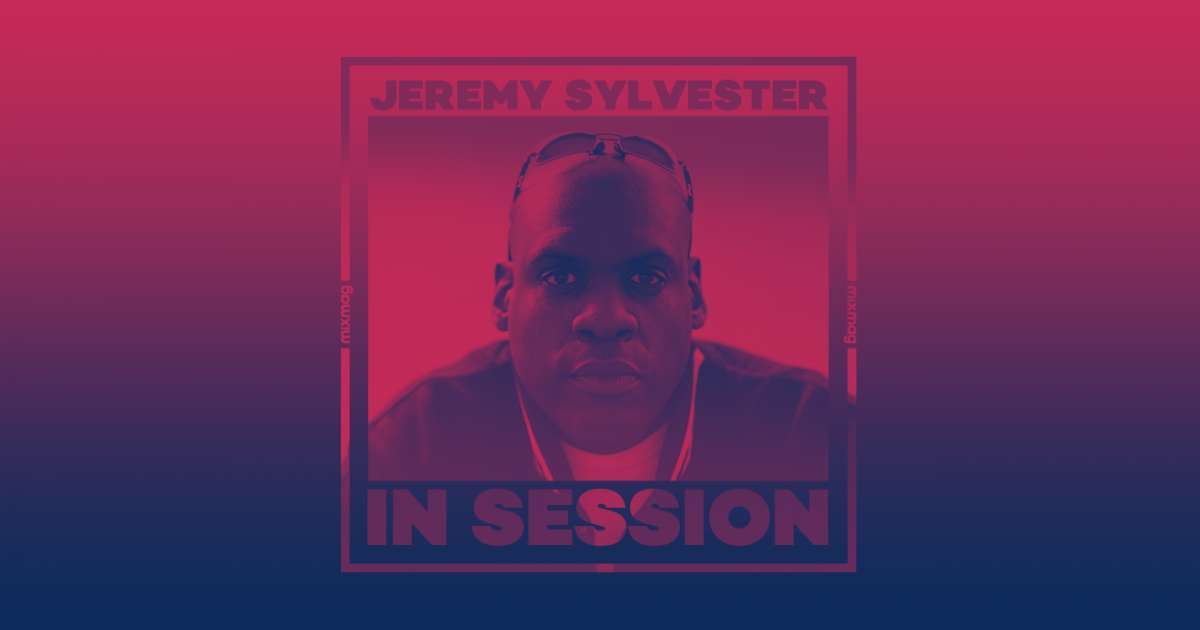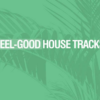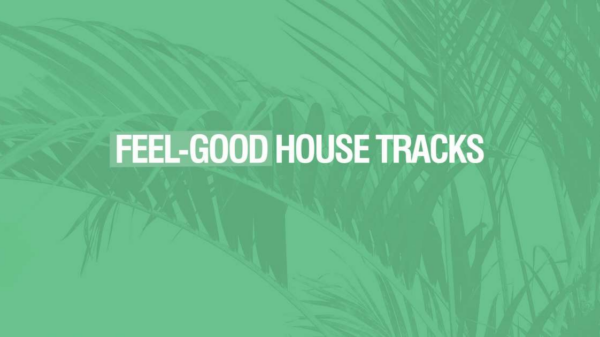The UK dance music legend serves up an hour of garage, 2-step and 4×4 heaters
Jeremy Sylvester is the many-named G.O.D of UK music. The Birmingham-born musical powerhouse has been producing since the early ‘90s, releasing a constant stream of timeless records across a variety of styles and aliases, including Strickly Dubz, M.F. Project, Deep Cover Inc, Dubtronix, Club Asylum and G.O.D. Whether he’s making grooving house, blistering jungle, bumping 2-step or raucous speed garage, his almighty back catalogue speaks for itself: he’s one of the most prolific and talented producers in UK dance music history.
Sylvester grew up in the Midlands and was inducted into music from an early age by his father, Charles Sylvester, a member of popular ‘70s and ‘80s soul and disco group J.A.L.N. Band. Much of Jeremy’s childhood was spent in rehearsal studios as the band, whose membership also included a number of his uncles, prepared for gigs around the UK and Europe, helping to inspire his love of music. The Sylvester family has roots in Grenada and growing up he would listen to Caribbean styles such as soca, calypso and reggae, as well as jazz, hip hop, classical, disco, funk, soul, new wave and more.
When he started making his own music, this broad range of influences inspired him to experiment with many different genres, channelling different elements into his own fresh musical takes. “It’s widely known that I quite like my 4×4 beats bumpy, which I would say draws some influence from my family’s soca roots, especially with that high tempo energy and snare swing,” he notes.
Read this next: UK Garage is the best genre ever
Moving to London in the early ‘90s he met DJs such as Karl ‘Tuff Enuff’ Brown and Matt ‘Jam’ Lamont, who gave him access to the JTS cutting plant, allowing him to make a tune one day and get it cut to a dubplate the next, ready to play in a club that night. Starting working with legendary London label Nice ‘N’ Ripe as an in-house producer was a pivotal moment in his musical career, giving him the space and resources to make and release records at an eye-watering rate. Many of the musical pseudonyms he came up with were born from feeling it was necessary to disguise the fact that so many releases were coming from one person.
“Experimenting with sounds is what I do best in the studio. The foundation of my music are the drums and my beloved drum machine and samplers, which I’ve had many of over the years, allowing me to experiment by sampling from vinyl,” he says. “That was my thing I loved to do. Finding sounds that inspire me and then taking it, manipulating it, cutting it up, detuning, reversing and making it my own. I had the most fun doing this with jungle music which was very heavily sample based at the time. You wouldn’t believe the amount of ways I’ve cut up an ‘Amen’ break, it’s unreal when I think about it now. I mean literally slicing up a four bar breakbeat into about 20+ pieces across the keyboard and replaying it ‘manually’ into a totally new groove pattern. Crazy! This is what I loved doing, whether it be with drum sounds, vocals, melodies and everything else.”
He’s also regularly collaborated with other artists over the years, dating back to his time in Birmingham with Bass-Funk-Tion and 3-Play alongside friends DJ Danny Technici and Spud, and working with his dad as Dubtronix, through to notable project Club Asylum alongside Paul Emmanuel, making many massive UK garage remixes and productions together, including working with the likes of Shola Ama, All Saints and Ginuwine. He’s also helmed labels such as Love House and Urban Dubz.
Read this next: 14 of the best UK garage mixes ever
Not even the pandemic could slow Sylvester down, with his music-making remaining relentless, alongside continuing to grow Urban Dubz as a multifaceted music business and platform, and working on sample pack development for his loopwax.com site and Splice. His contribution to UK dance music is legendary, and he deserves to be heralded as one of the greats.
We spoke to Jeremy Sylvester about his remarkable career, his thoughts on the contemporary garage scene, not getting his due respect within the UK dance music industry, and why it’s important to accurately document music history. Check it out alongside his In Session mix below.
You’ve released music under numerous different aliases. What made you want to create new names for so many of your releases?
Many people ask me about this and I surprise even myself when I look into Discogs to remind myself how many aliases and tracks I’ve produced over the years. My time at Nice ‘N’ Ripe was ‘GOLD’ to me, as their in-house producer at that time, they allowed me to be myself and just to do what I do really. I love music and I can go into any direction musically, so sometimes I may come up with some cool ideas for a 4×4 house beat that’s quite nice and soulful, other times I may feel in the mood to make a disgustingly filthy speed garage bassline wobbler. So I can flip from one extreme to the other.
The sheer amount of output we were releasing via Nice ‘N’ Ripe and its sub-labels, with releases on a weekly basis, it didn’t really make sense putting everything out on one name, as we didn’t feel it would be right to ‘flood’ the vinyl market with releases on one name. The various styles I was producing, it made marketing sense to drop certain styles out on certain names, for instance, my Deep Cover Inc style was very much a 4×4 house style with early influences of my jungle productions as Dubtronix, with heavy sampling of old jungle records etc.
The stuff I released on the GOD Limited Series from Volume 2-5 on N’N’R had more direct emphasis on big basslines, chunky beats, big breakdowns and big build ups, some people would call it speed garage. But then you have Club Asylum on the other side of the spectrum, where we focussed on using early ‘90s R&B vocals sampled at the beginning from American imported vinyl records I used to buy on a weekly basis, and then dropping those vocals over my raw 4×4 garage beats, which took it to a more radio friendlier angle with more chord structure and progression.
So as you can see, I can be quite broad in my musical direction, so it made perfect sense to have all these aliases in place for when I do more of those styles.
I know it did confuse a lot of people, and to this day, many people don’t realise I made certain records, unless you’re a real vinyl junkie who actually reads the credit on the record or can simply tell from my sound that it’s a ‘Jeremy Sylvester’ made record.
I remember I used to be surprised when I’d find another garage banger and discover it was by you as well, but now it’s just standard: like, yep, of course this is another Jeremy Sylvester alias! Do you think many people realise that so many of these classic tunes are by one person?
Like I was saying, the various aliases/pseudonyms and sheer amount of output didn’t help that! Recently, because of social media, and because I’ve been so active on there for the past 10 years or so, I’ve been putting out snippets of various older tracks I’ve produced over the years on my Instagram, Twitter and Facebook accounts and surprising a lot of people — even super fans who have supported me from day one, now discovering I’ve produced certain tracks they had sitting in their record collection for years. I find quite funny, I’m not gonna lie; I’ve sometimes had a track get played to me by someone asking if I’ve done it or not, and I’ve had to stop and think for a second, or wait ’til the drop or something, and I’ve almost forgot I actually made it! Not very often though it happens, but it has! I call those years my ‘RINSE OUT YEARS’. I was on a roll banging out tunes left, right and centre in the late ‘90s, early noughties.
Read this next: The 15 best speed garage records released in ’97 and ’98
You founded a lot of aliases while you were working with Nice ‘N’ Ripe, how important was your relationship with that label to your career?
Working with such an influential label as Nice ‘N’ Ripe with its huge stable of UK producer talent who I respect and admired was so important to me. I came to N’N’R as a fan also as a producer, so for James [Cylne] and George [Power] to love my music at that time for me was a big deal.
My ties with the label still serve me well today, and have introduced me to so many people who I still work with or am still friends with today. It was part of the foundations of my sound, and the label itself became a bench mark for many record labels to this day, so I’m quite proud to have come up through that time. Much more has happened since then, but I will never forget my time on that label.
I created a huge back catalogue of music which most of it I’m glad to say I own copyrights for, which has allowed me to work my catalogue over the years with re-vamps, re-releases, and various compilation albums I’ve put together with my old tracks via my own label Urban Dubz Music.
I also have a huge collection of unreleased music which has never seen the light of day, not released for whatever reason, most probably because I had so much other music out there already so as to not flood the market. I also made various mixes of tracks that didn’t quite make an official release with digital MP3, USB and vinyl releases via my Bandcamp and distributed to the main stores. I’m actually still finding DAT tapes with my music on to this day which is always an exciting moment when I listen through it to remind myself what planet I was on back in the day.
Despite so many hits to your name, you don’t seem to be mentioned in the same breath as canonised UKG DJs like MJ Cole and Artful Dodger, which is something Conducta raised in his DJ Mag interview — he put it down to industry whitewashing of the scene and Black artists not receiving the same dues as white peers. Is this something you agree with? Do you think your contributions to UK garage have been fairly respected?
To be honest, I would have to agree with much of what he said regarding that matter. I’ve been totally aware of this for many years but never vocal about it, and often wonder how much more do I have to do to get the type of credit I believe I deserve in this business with my music. But I’m naturally very optimistic, a go-getter type of person who’s very driven, so I can’t afford to let that type of thing affect me from my focus — and that was, and is, to just do what I love and make good music.
I guess this is why I’ve worked so hard to try be an independent operator, running my own ship, owning my back catalogue, releasing my own music as and when I please, and by doing so, I’ve created quite a large fanbase from around the world who have supported me for many years with my music.
I did often think about some of the collaborations I’ve had in the past for instance with my ‘white friends/production partners’, we seemed to generate more attention ‘within the industry’ more so than publicly, compared to if it was just me. But again, I tried not to pay too much attention to it, otherwise If it did affect me, I probably wouldn’t be doing music and would have packed it in a long time ago… My old man (RIP) always said from the beginning, OWN your music, build your catalogue of music and you will be ok.
But yes, I do feel I have haven’t been fully respected despite the amount of works I’ve produced over the years, but this is all changing. Social media has a great deal to do with it, and my story will and is being told in my own time and choosing, and people will not be able to ignore it.
Read this next: NUKG: Conducta is building a sustainable future for UK garage
Artists like Conducta and his Kiwi Rekords crew are part of the nu-skool of UK garage artists, who are often careful to uplift their forerunners as well as carving their own path in the genre. What do you make of the UK garage being made these days and the artists’ approach to the culture and sound?
I’ve been a big fan of Conducta for a little while now. I discovered him a few years through his label/management, and at that time they wanted me to work with him. You can hear he’s been influenced by the likes of myself and others within his music, staying true to the roots and origins of the UK garage sound, yet as you say, carving out a path for himself in his own unique way.
My ears are always firmly to the ground when it comes to new music, so I’m very much aware of what’s going on within the scene, watching up and coming producers coming through from the likes of DJ Perception who I’m a massive fan of, Highrise, MPH, DJ Q, Swindle, Preditah, Tuff Soul, Timbawolf amongst many others.
The future’s bright and it’s great to see people like them carrying the UKG torch for the next generation. The one thing If I’m honest I don’t really like is this separation of old skool garage and nu skool Garage, I’ve never quite understood why that is.
I mean, you never ever see that within other genres, perhaps maybe old skool jungle and d’n’b, but for me, garage is garage, house music is house music, hip hop is hip hop. From a marketing perspective I do understand to a certain degree, and perhaps because of the negative connotations of early UKG with all the club trouble surrounding that, I guess that was the thinking behind that. I don’t know — but at the end of the day, it still lives on and is still going strong, so that’s the main thing.
Why do you think UK garage has remained so popular for so long?
UK garage has remained popular over years over here because it is truly a UK sound and our OWN sound, just like jungle/drum ‘n’ bass. I think its tempo and energy is very unique and makes it stand out. Whether you’re hearing a stripped down chunky 4×4 garage beat with sparse cut-up vocals over a silky, stabby sub-bass groove, or whether your hearing the dynamic kick drum and snare pattern 2-step groove over an R&B vocal with lush chords and melodies, there’s no mistaking that sound.
It’s crazy, every time, for example, I hear my Club Asylum remix of Shola Ama ‘Imagine’ in a club and the crowd is still going nuts over it, more than 20 years after I made it, is bizarre. It still sounds as fresh as it was back in the day.
The sound is so ingrained within our culture, it’s now part of the fabric. All those people who said UK garage was a passing fad and would be replaced by some other sound are truly eating their words now. UK garage is global.
I first saw that when I was in New York at the time we was having our hits as Club Asylum in early 2000s. Walking through Manhattan, I’m hearing the sounds of UK garage blasting out the windows and bars of clubs and restaurants over there, and what was more crazy to me was hearing my own music played out there too, which was surreal. So UKG has truly made an impact all over the world and we should all be proud of it, again just like what jungle/d’n’b did globally.
A number of your classic bangers have been given updated remixes recently, what inspired you to rework that music for contemporary releases?
Yes I’ve just recently re-released a few of my early tracks, with one of them being Strickly Dubz and a track called ‘Realise’ which as a big 2-step tune from back in the day. I decided to re-release it with brand new remixes from Perception, Highrise, Groove Chronicles and BK298. These are available via my Bandcamp on a strictly limited vinyl run of 500 copies (signed). I also re-released an early GOD Limited Four EP with a brand new SLY mix of ‘Watch Ya Bass Bins’ — all released on vinyl exclusively on my Urban Dubz label.
Another popular record re-released was ‘The M.F. Project’ as Miles Fontaine, which was a two-tracker EP featuring ‘9-5’ and ‘Gotta Have House’, which were highly sought after vinyl for many years by collectors. I put out a limited 500 vinyl run and sold it through my own Bandcamp page exclusively.
Over the years I’ve had so many requests from producers who wanted to remix them, so thought it was the right time to do so and with great success. I will be continuing to do limited vinyl (and digital) runs of back-in-the-day classics of mine, alongside some remix producers I really like and respect.
Read this next: UK garage: the 40 best tracks of 1995 to 2005
You’ve run a number of labels such as Love House and Urban Dubz, what are the main aims you’re trying to achieve when running a label?
Around 2004-5, I initially set out to start my own label as a digital and vinyl outlet to release my own productions. A label who I was signed to right after my Nice ‘N’ Ripe years was Azuli Records, based above the legendary Black Market Records in Soho London. Unfortunately Azuli went out of business, so I needed to have something in place where I could continue releasing my music. Urban Dubz the label was formed.
At the beginning there were only a handful of vinyl releases on the label mainly from myself, with a few limited CD compilation albums, but my vision for the label and the brand was far bigger. I wanted to branch out into clothing/apparel, so with my sister’s help, who just so happened to be the one of the head designers at Sergio Techini and Puma, came up with some designs for Urban Dubz, where I was initially making T-shirts and selling them online via my website and in select store/markets up and down the country.
It done quite well for me and allowed me to branch out into other area such as music PR services for the music industry, which is still going to this day, focusing on urban and electronic music promotion for small independent artists and producers from around the world.
Today Urban Dubz is an established and thriving underground music brand with a number of artists/producers on the label, focusing on, and staying true to, the roots of my music: house, garage and beyond. We’ve also stepped into the arena of LIVE streaming with weekly shows from our DJs, and further expanding our range or apparel merchandise via urbandubz.com, and also have Urban Dubz music events planned for 2022.
You put out some short videos about your journey in music last year through your Urban Dubz platform, what inspired you to make and publish those?
The year of the pandemic was a testing time for everyone, and I suddenly found I’ve got all this free time to myself, so I decided to put together some very short videos explaining certain parts of my musical history and journey, which I had never done, or even been asked to do, before.
These video were really just the pre-cursor to a larger documentary I am looking to do later on down the line with the right director.
I really just wanted to connect some of the dots within my history, because so many people know me, but for different styles/genre/names. I wanted to piece it all together and let my fans know how it all began and where I Intend to go with my musical journey. Like I was saying earlier, more people are discovering tracks that they didn’t even realise I made. So I’m basically setting the record straight.
Read this next: Todd Edwards picks his 10 favourite garage tracks
Do you think archiving music history is important? Would you like to see more documentaries accurately telling musical histories, for example?
I think it’s majorly important to tell your story in this day and age. Unfortunately there are people out there who will choose to erase elements of your past to benefit themselves or their agenda, but the beauty about this day and age is that we have this thing called ‘the internet’ and ‘social media’. Now your story can be told in your own way, in your words, in your own time, and set the record straight.
I always love when I read about a producer, DJ or musician; I like to learn about how they came to do what they did and the struggles that entailed. It helps to inspire the next generation of producers coming through. That’s what I’m all about.
Can you tell us about your In Session mix?
A choice selection of tracks spanning early years to present day. There’s a mixture of just a few of my favourite 2-step and 4×4 tracks, and it includes some of my early back catalogue productions and unreleased tracks. I hope you like it and enjoy the mix.
Patrick Hinton is Mixmag’s Digital Editor, follow him on Twitter
Tracklist:
Chris Mac- Cant Get Enough
Whitney Houston – Heartbreak Hotel (Undadoggz Club Rub)
Perception – Personality Dub
Dubaholics ft Jenifer Kar – DJ Do That Thing
Noodz – Live it up (Club Asylum Dub Mix)
Steve Gurley – I’m Glad you came (2 Step)
Strickly Dubz – Realise (Highrise Dub Mix)
Club Asylum ft Mighty Mo – I believe (2step mix)
Perception – Kutting Kloser
Colour Girl – Things Are Never (Original Mix)
Jeremy Sylvester ft Kayleigh Gibson – That Vibe (Perception REMIX)
Restless Natives – I Wanna Know (Club Asylum Vocal Mix)
Colour Girl – Tears (Dreem Teem Remix)
Colours & Stephen Emmanuel ft. Eska – What U Do (10 Degrees Below Remix)
Slypaul – Crazy Dub
Strickly Dubz – Thinking of you (Cosmopoliton Mix)
Dub Syndicate – Feel Your Soul – PROMO ONE
Urban Spirits – Pressure (Clay & Deller Industry Standard Mix)
Undercover Trax – Phunkaa
Underground Solution
Greg Stainer and MJ – VIP
Jeremy Sylvester – Where Brooklyn At
G.O.D Limited (Jeremy Sylvester) 4 – Watch Ya Bass Bins (2020 Remix)
Jeremy Sylvester ft Colonal Abrahams – Trapped
G.O.D Three – What You Want (Alt Mix 2)
Dub Syndicate – Yeahh
TUFF JAM – Special Request
A weekly rundown of everything you need to know in music and culture
Mixmag will use the information you provide to send you the Mixmag newsletter using Mailchimp as our marketing platform. You can change your mind at any time by clicking the unsubscribe link in the footer of any email you receive from us. By clicking sign me up you agree that we may process your information in accordance with our privacy policy. Learn more about Mailchimp’s privacy practices here.







